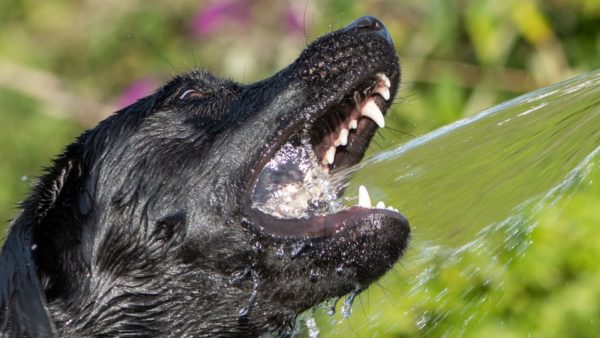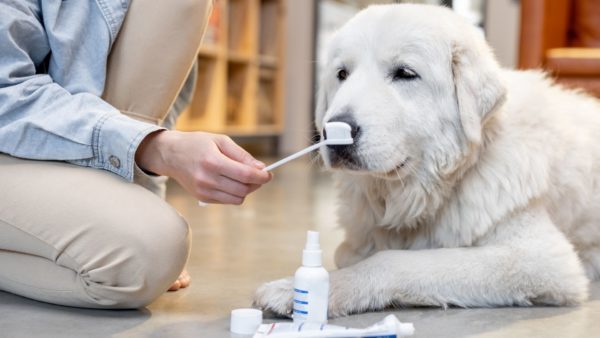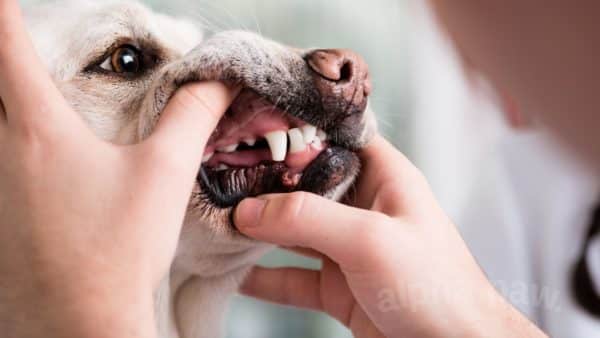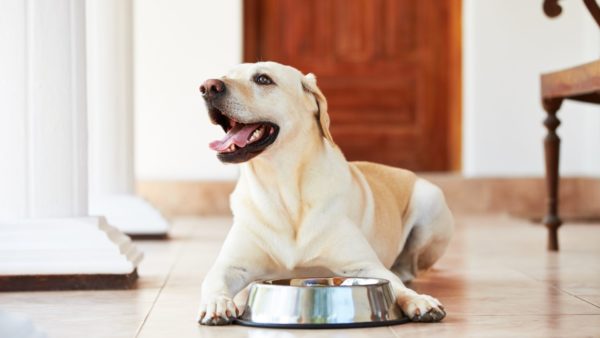


Some studies suggest that 80% of three-year-old dogs have one form of gum or periodontal disease so it’s important to start preventive measures early on. Dog mouthwash, especially Magic Mouthwash™ for Dogs, is a safe product specifically formulated for our canine friends for preventing a wide range of oral health problems.
In dogs, poor dental health can lead to many other health complications, including cardiac pathologies, implementing a dental care routine is essential.
Read on to find out more about dog mouthwash and maintaining Fido’s dental health in check!
Xylitol, an ingredient in doggy mouthwash, has been causing some concern over the years. In some amounts, xylitol can cause hypoglycemia, liver failure, and in some cases, seizures in dogs.
However, most of the pet mouthwashes available now are contain very low amounts of this ingredient. When using mouthwash, you will have to add an average of 1ml of the additive to your canine friend’s water bowl.
Since most animal mouthwashes contain less than 0.5% of xylitol per bottle and it takes about 50-100ml of xylitol to cause hypoglycemia in a small breed, it’s probably nothing to worry about.
However, if you discover a product that doesn’t contain any artificial sweetener whatsoever, that one would be an even better choice.
Choosing the best mouthwash for your furry friends is essential for maintaining their oral health. Look for a pet-friendly mouthwash that is specifically formulated for cats or dogs, as human mouthwash may contain ingredients that can be harmful to them.
The health of these two plays an important part in preventing other diseases, including cardiac complications.
It’s not uncommon for an animal with a gum infection to develop other conditions. If your pup’s gums bleed relatively often, oral bacteria will reach the bloodstream through the lesions.
Some breeds, such as small breeds such as the Chihuahua or the Dachshund, are more likely to develop oral health problems than others. This is why in their case, a dental hygiene procedure is necessary every 4-6 months. Left untreated, gingivitis can quickly lead to periodontosis, which can eventually cause tooth loss.

Foul dog breath can be a sign of other health issues, but it’s quite common for an animal’s teeth and gums to smell somewhat unpleasant.
A dog’s mouth is not the cleanest place on Earth. Like us, dogs and other animals have germs in their mouths and the only way of keeping their numbers in check is to practice good dental hygiene.
Stinky pet breath can be a result of a poor diet. However, it can also mean that your dog’s digestion isn’t functioning properly or that they simply have too much plaque and tartar in their mouths.
Gum disease can be another reason for a dog’s bad breath. If your pet doesn’t get veterinary care for this problem, it can put their health or even life at a risk. Alarmingly, studies suggest that 80% of three-year-old dogs have one form of gum or periodontal disease.
Not only can bad breath be a sign of poor oral health, but it can also be a symptom of other health issues. Pet owners should keep an eye on their canine friends’ behaviors to notice whether something might be wrong with their pup besides bad breath.
Pets with bad breath, especially those that are older than the age of 7, are likely to suffer from other medical conditions. The most common ones associated with poor oral care and a subsequent bad mouth smell are the following:
While medical complications are less likely to affect a puppy, they can significantly influence a geriatric pet’s general health. Older pets have a higher likelihood of suffering from other diseases, so adding a medical condition on top of the ones they already have can sometimes even put their life at risk.
That’s why practicing good oral health and regularly checking on your dog’s mouth and breath is the best solution.
The lack of an oral care routine or bad dental care (i.e., cleaning your pet’s teeth once every two months) is at the top of the list when it comes to why your dog has bad breath.
Periodontal disease is the second most common cause of a foul mouth smell. Unfortunately, by the time it is discovered, its development could be so severe that your dog might lose several teeth. Periodontal disease also leads to gum problems.
While you can’t expect your pup to have fresh breath all the time, you should pay attention to any changes in this sense. It can be a sign that your dog ate something weird (feces) or even toxic (rat poison). But it can also be a sign of an oral tumor.
Our best advice to you is to take your dog to the vet at least once a year for a regular check-up as it can prevent dental complications and gum disease.
Use mouthwash on a regular basis. You want the dog mouthwash that you purchase to be as natural as possible. It should be used as a water additive. Its scent should be mild, so a strong flavor like mint is a no-go.
Have a look at the ingredients to see how much xylitol is in it. If it has the VOHC (Veterinary Oral Health Care) seal, it’s definitely safe and capable of preventing oral health problems.
Chlorhexidine is a great mouthwash ingredient as it manages to disinfect your dog’s mouth and freshen their breath without causing any complications such as antibiotic resistance.
A good mouthwash for dogs should also have a formula capable of preventing tartar buildup. You should be able to add it to your pooch’s water without worrying that it might lose its effect throughout the day. While you can dip your dog’s toothbrush in it and tend to your regular teeth-brushing routine, this shouldn’t have to be mandatory.
Finally, a bottle of mouthwash for dogs should have a reasonable price and last for a while. Alpha Paw’s Magic Mouthwash is made with natural ingredients and helps to keep a dog’s breath fresh in between cleanings.

Brushing your dog’s teeth with quality toothpaste and a toothbrush once a day or every several days is the best way of ensuring that the amount of plaque and tartar that does build up on your dog’s teeth never gets out of hand.
It might seem like a tedious and uncomfortable process for everyone involved, but the truth is that brushing your dog’s teeth ensures way better dental health compared to other solutions, including using mouthwash or water additives to prevent tartar buildup.
Moreover, it also allows you to mechanically remove the plaque on your pooch’s teeth, which is rich in bacteria. While a healthy, adult dog might not have too many issues with its oral health, the bacteria in Fido’s mouth is always potentially pathogenic.
This means that it’s waiting for an imbalance in your dog’s immune system so that it causes gum inflammation and infection. If you’ve ever had a toothache before, you probably know how ‘fun’ these can be for dogs.

If you know that you don’t brush your dog’s teeth often enough, you can’t expect the plaque and tartar buildup to go away on its own. Consequently, we suggest going to the vet clinic once every six months to find out if your dog isn’t due for teeth cleaning.
Removing plaque and tartar by yourself at home isn’t recommended. If your dog’s deposits are significant, the veterinary professional will have to use a mechanical procedure where they physically remove the pieces and leave your dogs’ teeth bare.
Your puppy might have to be sedated to withstand this procedure as it can be a little painful.

Using a natural water additive, brushing your friend’s teeth with the right toothpaste, and making sure that their teeth and gums are healthy are great, but did you know that bad breath can also be caused by dog food?
Nutrition-wise, a dog that doesn’t get enough vitamin A, B2, B3, B5, and B9 is more likely to develop gum problems. And with any gum and the dental problem comes a foul mouth smell. Have a talk with your vet about the diet that’s most recommended for your pooch as they’ll know what’s best for them (based on their age, nutritional requirements, and potential health issues).
Also, did you know that besides using water additives, you can decrease the number of bacteria and mineral deposits inside your dog’s oral cavity by buying the right type of kibble? These days, there are diets specifically formulated to be coarse and ‘brush’ your dog’s teeth as it’s eating. Your dog food should be as fresh as possible.
Chlorhexidine dental wipes or those with other safe disinfectants are now available. While they do not replace regularly toothbrushing, they can be used for minimizing foul dog breath. Plus, most don’t even contain ingredients like xylitol.
We advise against getting dental wipes with a strong mint flavor as it can be off-putting to your pooch to the point that they start avoiding you when they feel their scent. Search for a natural alternative that gets the job done without causing your canine friend any distress or discomfort. Ideally, it should be xylitol-free.

Besides using a water additive and toothpaste, you can also rely on dental chews and treats including Alpha Paw’s dental stick and Victor’s apple snacks. Like the kibble that we were referring to earlier, these are usually made to be coarse, so they mechanically remove at least some of the bacteria present in the animal’s mouth.
If your pooch tends to get bored easily, you can add a bit of variety to their life. You can use a fresh mint-flavored treat one day to freshen their mouth smell and opt for another flavor the next one.
Chlorhexidine in itself is an antiseptic and disinfectant, so it’s one of the most common ingredients that you can find in an antiseptic (or water additive) mouthwash for dogs.
The biggest benefit of this substance is that it’s completely safe. To date, there haven’t been any cases where the oral microbiota developed any resistance to it (as they have to antibiotics, for example).
But since the term ‘antiseptic’ is a broad one, meaning that it includes both mild disinfectants such as chlorhexidine and harsh ones such as alcohol, our best advice is to get as informed as you can before buying a mouthwash for your canine companion.
Some vets used to apply Betadine to the skin of any animal they would perform a procedure on (surgery). While it’s less commonly used for the oral cavity, Betadine tends to make any skin section or mucous membrane it is applied on dry or even very dry. By contrast, chlorhexidine doesn’t have the same effect.
You can’t remove tartar at home if Fido has a lot of it on their teeth. Do not attempt to remove it mechanically using sharp or pointy objects. If your canine buddy doesn’t sit still, you run the risk of causing a serious gum injury. Tartar can’t be removed with a toothbrush, either.
The mineral deposits can at least be prevented. Practice tooth brushing every day, use a freshwater additive, give your dog a dental treat every now and then, and use dental dog food for the best oral hygiene.
Use the same tips for preventing plaque deposits and removing excess bacteria. Add a dog mouthwash or chlorhexidine water additive to the one that your dog’s supposed to drink every day and tend to your regular dental hygiene schedule as usual.
Some dog mouth sprays can prevent bacteria from building up inside your pooch’s mouth, too.
While some pet owners who like to keep their furry friend’s diet as natural as possible might argue that feeding them bones and other such coarse food can also mechanically remove bacterial deposits, we advise against doing so.
Chicken or turkey bones can be dangerous and can cause intestinal blockages that can make you both end up with an emergency at the veterinary clinic.
No. You should avoid using any dog dental care products that aren’t, in fact, made for dogs.
In fact, Listerine contains a number of harsh ingredients ranging from methyl salicylate to ethanol and menthol (not mint), all of which can have a negative impact on your dog’s health.
This mouthwash produces a powerful burning sensation in your dog’s mouth, which could cause discomfort and vomiting. Plus, it contains alcohol, which automatically makes it unsafe.

The medical, nutritional, or behavioral advice we provide is intended for informational and educational purposes only. Our editorial content is not a substitute for formal or personalized medical advice from a veterinary professional. Only board-certified veterinary specialists who have examined your pet should diagnose medical conditions, provide personalized treatment, or prescribe appropriate medication. For questions regarding your pet’s health, or if your pet is exhibiting signs of illness, injury, or distress, contact your veterinarian immediately. Never disregard professional medical advice or delay in seeking it because of something you have read on our site.